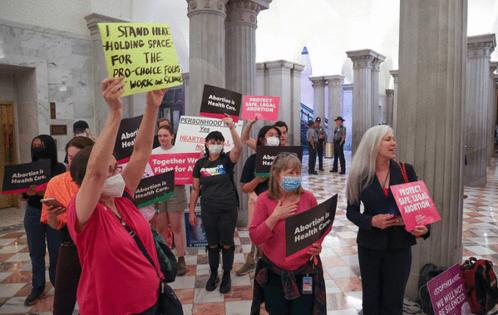waiting for photo // South Carolina Supreme Court rules on when fetal heartbeat abortion restrictions begin
Published in News & Features
COLUMBIA, S.C. — South Carolina’s abortion restrictions apply when electrical impulses are first detected by diagnostic medical equipment — generally around six weeks, the state Supreme Court ruled, handing a loss for Planned Parenthood South Atlantic.
Planned Parenthood sued saying the state’s 2023 law that bans abortions after a fetal heartbeat is detected should be be applied a the nine-week mark rather than six weeks. At nine weeks a fetus’ heart is fully formed. At six weeks is when the first detectable sound of a heartbeat can be heard.
“While we do not frame our holding today in the shorthand terms of a number of weeks, the biologically identifiable moment in time we hold is the ‘fetal heartbeat’ under the 2023 act occurs in most instances at approximately six weeks of pregnancy,” Justice John Few wrote in the majority opinion.
When lawmakers debated the fetal heartbeat ban, which went into effect in 2023, they repeatedly said the ban would be at about six weeks, making it the legislative intent of the law.
“The General Assembly itself debated and discussed the 2023 act exclusively in terms of a six-week threshold beyond which most abortions may not occur,” Few wrote in the court’s 5-0 ruling, which also included a concurring opinion from Justice Gary Hill.
When the state Supreme Court first upheld the constitutionality of the fetal heartbeat law, it left open the question of six versus nine weeks, giving Planned Parenthood a potential opening to challenge the law again.
Planned Parenthood said during early court proceedings 86% of its patients seeking an abortion who are being turned away would be able to have an abortion if the law was at nine weeks.
“The General Assembly was referring to the occurrence of electrical impulses that mark the early onset of ‘cardiac activity’ as we interpret ’fetal heartbeat’; the General Assembly was not referring to the beating of the four chambers of a more fully developed heart that does not occur until after nine weeks of pregnancy,” Few wrote.
South Carolina’s abortion restrictions has forced women who are seeking an abortion after the six-week mark of a pregnancy to travel to another state. Georgia and Florida ban abortion at six weeks. North Carolina bans abortions after 12 weeks. Virginia allows abortions up to 26 weeks and 6 days.
“Time and time again, we have defended the right to life in South Carolina, and time and time again, we have prevailed,” Gov. Henry McMaster said in a statement. “Today’s ruling is another clear and decisive victory that will ensure the lives of countless unborn children remain protected and that South Carolina continues to lead the charge in defending the sanctity of life.”
South Carolina allows exceptions for rape and incest up to 12 weeks of a pregnancy, to save the life of the mother or if the baby has a fatal fetal anomaly.
“The extreme ban on most abortions is endangering the lives of pregnant South Carolinians and driving medical care providers away from our state,” Jace Woodrum, executive director of the ACLU of South Carolina, said in a statement. “Many people do not find out they are pregnant until after the six-week cutoff that is now being imposed under South Carolina law, and the list of exceptions is so narrow that doctors are struggling to provide life-saving reproductive care for fear of criminal prosecution.
Planned Parenthood in a statement said the political stance taken by the state’s lawmakers have caused harm to families and South Carolina’s health care system.
“Justice did not prevail today, and the people of South Carolina are paying the price. People have been forced to carry pregnancies against their will, suffered life-threatening infections, and died as a direct result of this abortion ban,” said Paige Johnson, the president and CEO of Planned Parenthood South Atlantic.
©2025 The State. Visit at thestate.com. Distributed by Tribune Content Agency, LLC.







Comments